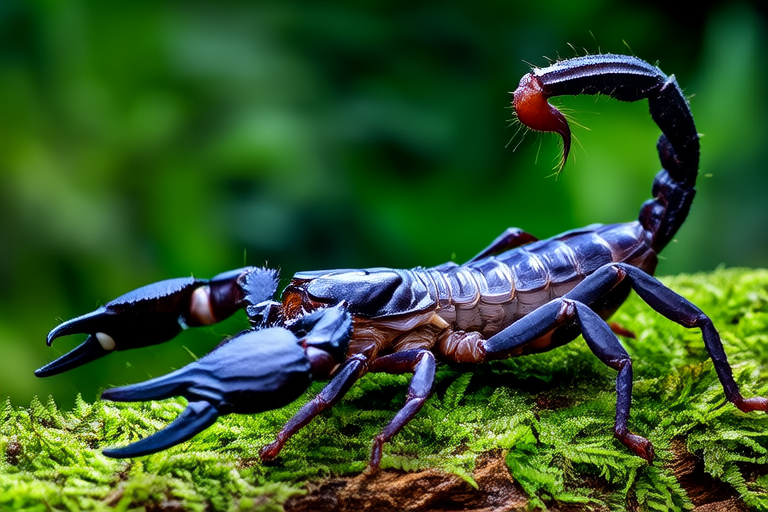From Jungle to Home: Caring for Your Exotic Pet, Heterometrus Spinifer
Welcome to the fascinating world of exotic pets! Among the diverse array of creatures that captivate the hearts of animal enthusiasts, the Heterometrus spinifer, commonly known as the Indian ornamental scorpion, stands out for its unique appearance and intriguing behavior. This article will guide you through the ins and outs of caring for this exotic pet, ensuring both you and your scorpion enjoy a rewarding relationship.
The Fascinating World of Heterometrus Spinifer
The Heterometrus spinifer is a medium-sized scorpion native to the tropical regions of India, Sri Lanka, and Southeast Asia. These scorpions are known for their distinctive spines along their tail, which give them their name. They thrive in humid environments with temperatures ranging from 75°F to 85°F (24°C to 29°C). In the wild, they can be found in dense jungles and forested areas, often under rocks or logs.
One of the most striking features of the Heterometrus spinifer is its vibrant coloration. Ranging from deep black to dark brown, these scorpions have contrasting red or orange pincers and tail segments, making them a visually captivating addition to any collection. Their nocturnal nature means they are most active during the night, hunting small insects and other arthropods.
Legal Considerations
Before bringing home a Heterometrus spinifer, it’s crucial to understand the legal aspects of owning an exotic pet. Regulations vary by country and even by state or province within countries. In many places, owning a scorpion requires a permit or license, and there may be restrictions on importing or exporting certain species. Always check local laws and regulations to ensure compliance.
Additionally, consider the ethical implications of keeping an exotic pet. Responsible pet ownership involves understanding the species’ needs and ensuring they are met without compromising the animal’s welfare. Engaging with reputable breeders or rescue organizations can help ensure your scorpion was ethically sourced.
Care Instructions
Diet
The Heterometrus spinifer is an opportunistic feeder, primarily consuming insects like crickets, mealworms, and wax moths. It’s important to provide a varied diet to ensure proper nutrition. Feed your scorpion once every two weeks, adjusting the frequency based on its activity level and size. Juveniles may require more frequent feedings. Always offer prey items that are no larger than half the width of the scorpion’s body to prevent digestive issues.
Housing Requirements
A suitable enclosure for your Heterometrus spinifer should mimic its natural habitat as closely as possible. A glass terrarium with a secure lid is ideal, providing ample space for climbing and burrowing. The enclosure should be at least three times the length of the scorpion, allowing it to move freely. Substrate options include coconut fiber, peat moss, or a mixture of both, which helps maintain the necessary humidity levels.
Maintaining the right temperature and humidity is critical. Use a thermometer and hygrometer to monitor these conditions, aiming for a temperature range of 75°F to 85°F (24°C to 29°C) and humidity between 60% and 80%. Providing a shallow water dish will help keep the environment moist and allows the scorpion to drink.
Environmental Needs
Scorpions need hiding spots and climbing structures to feel secure. Incorporate cork bark, rocks, and branches into the enclosure. These items also aid in maintaining humidity by retaining moisture. Ensure all decorations are securely placed to prevent accidents. Regular cleaning of the enclosure is essential to prevent bacterial growth and ensure the health of your pet.
Handling and Health Maintenance
Handling
While Heterometrus spinifer can be handled, it’s important to approach them with caution. Scorpions are naturally defensive and may sting if threatened. Always handle them gently, using tweezers or thick gloves. Never grasp the scorpion by its tail or pinchers, as this can cause injury. Regular handling can help acclimate the scorpion to human presence, but always prioritize its comfort and safety.
Health Maintenance
Regular observation is key to maintaining your scorpion’s health. Look for signs of distress, such as lethargy, loss of appetite, or changes in behavior. A healthy scorpion will be active, eating regularly, and showing no signs of external parasites. If you notice any issues, consult a veterinarian specializing in exotic animals.
Common health issues include dehydration, mite infestations, and injuries sustained during handling. Ensuring the enclosure is properly maintained and providing a balanced diet can help prevent many of these problems. Regular check-ups can catch potential issues early, improving the chances of successful treatment.
Responsibilities and Rewards
Owning an Heterometrus spinifer comes with significant responsibilities. Proper care requires commitment to understanding and meeting the scorpion’s needs. However, the rewards are substantial. Watching your scorpion explore its environment, hunt for food, and interact with its surroundings can be deeply satisfying. Each interaction offers insight into the complex behaviors of these fascinating creatures.
Moreover, responsible pet ownership contributes to conservation efforts. By choosing ethical sources and providing excellent care, you support the well-being of these animals and raise awareness about their importance in ecosystems. Engaging with fellow enthusiasts and participating in community events can further enhance your experience and deepen your connection to these extraordinary pets.
In conclusion, caring for a Heterometrus spinifer is a rewarding endeavor that requires dedication and knowledge. By understanding its unique characteristics, legal considerations, and specific care needs, you can provide a loving home for this exotic pet. Embrace the challenges and celebrate the joys of sharing your life with a Heterometrus spinifer. Happy petting!
